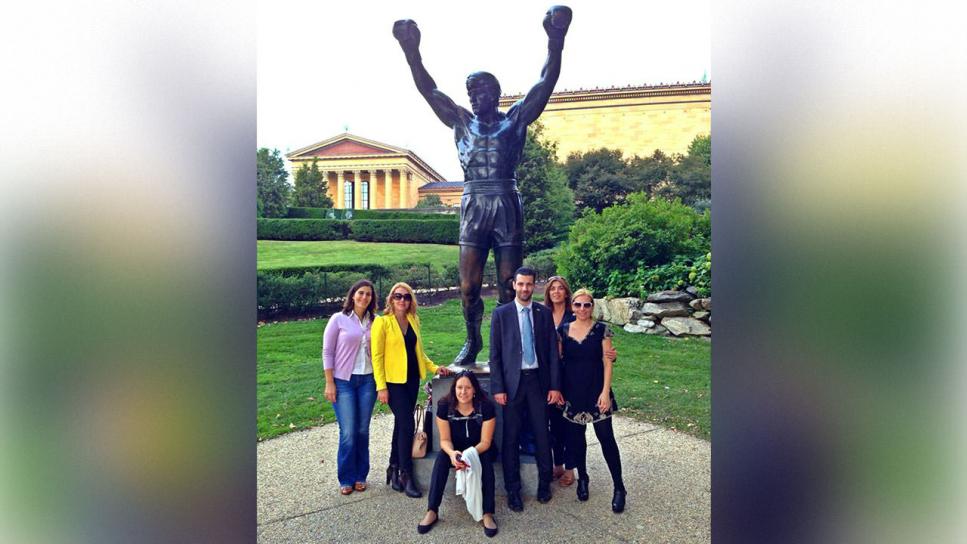State Department Exchange Program Networks U.S., Philadelphia Universities with Counterparts in Greece
By George Mesthos
Could Philadelphia play a role in Greece turning around its youth unemployment struggles? Recently, a contingent of five Greek university educators visited the City of Brotherly Love on the U.S. Department of State’s International Visitor Leadership Program (IVLP). Their mission: see how American schools maintain and sustain career development offices and alumni networks.
The delegation of four career center directors and a Ministry of Education official found that the city, universities and businesses have long realized that they need to convert education into opportunity.
“Everyone, from local politicians to education services and entrepreneurs, are trying to connect with each other,” said Giorgos Saragas, project manager at the University of the Aegean, “and they have a strategy of bringing together education and the labor market.”
The trip to Philadelphia included visits to Temple and Villanova universities, each well-established private schools with substantial alumni and career development programs in their own right, which gave the educators ideas for their own institutions back home.
Their visit to the City of Philadelphia Department of Commerce was a watershed moment. Philadelphia engages with universities and businesses in long-term strategic planning to attract students and keep them in the city as professionals. The issue of addressing “brain drain” resonates with Greeks, accustomed for generations to seeing many of their best and brightest go abroad.
“It is a success story for the whole city that through empowering job opportunities offered by entrepreneurs and their collaboration with the Universities they managed to give life to the city,” said Fenia Adamidi, Director of the Greek Ministry of Education and Religious Affairs General Secretary’s Office.
“In Philadelphia, we heard about Corporate Membership programs that companies are proud to be part of, about alumni who return to their universities and wish to give back to their institutions financial support and expertise,” said Cleopatra Deliou, from the Athens University of Economics and Business, “People who are passionate to work with students and engage with them. We miss that in (the Greek) educational system.”
The Greek context is, of course, quite different from the United States. American students are consumers who often invest tens of thousands of dollars in their educations seeking – and expecting – a return on investment. In Greece, public university education is free of charge, postgraduate degrees are affordable, and there has been little expectation of maintaining alumni relationships after graduation or having professors take on advising or mentoring duties.
In 2011, the Greek government passed sweeping university reform legislation to better align post-secondary education with the labor market, and the European Union provided multi-year funds to stimulate university career centers. Over the past few years, these five educators have been part of a significant change in approach, and have had some success in connecting students to employment, or at least helping them develop the skills to be more competitive candidates. Still, even commendable efforts across Greece’s education landscape remain disconnected.
The underlying challenge is making Greece’s career development efforts sustainable, when their public funding is not guaranteed for the long term. Some of the issues the Greek delegation discussed with their American counterparts included: Could a non-profit consortium of Greek university career offices modeled off organizations in the United States be part of the answer? How would fundraising work in the Greek legal context? What are the lessons from social media and crowd-funding that could be used to innovate?
As U.S. international exchange program alumni, these participants are now part of a large network, including thousands of Greeks and Americans who have gone on exchanges to Greece. Through alumni.state.gov they are eligible to design and fund team projects through programs like the Alumni Engagement Innovation Fund (AEIF).
In addition to Philadelphia, the delegation discussed best practices in Washington, D.C., Maryland, Delaware, and Michigan. Everywhere the Greek contingent went, they found an audience eager to learn how they found success in Greece’s difficult environment.
Efthalia Xeronomaki from the University of Ioannina is confident these best practices can be applied and adapted to the Greek environment. “This program has opened new communication channels with exceptional professionals in the United States,” Xeronomaki said. “We will certainly keep in touch, in order to boost further our work.”
George Mesthos is a U.S. Foreign Service Officer with the U.S. Department of State, and a third generation Greek-American born and raised in Burlington County, South Jersey.



